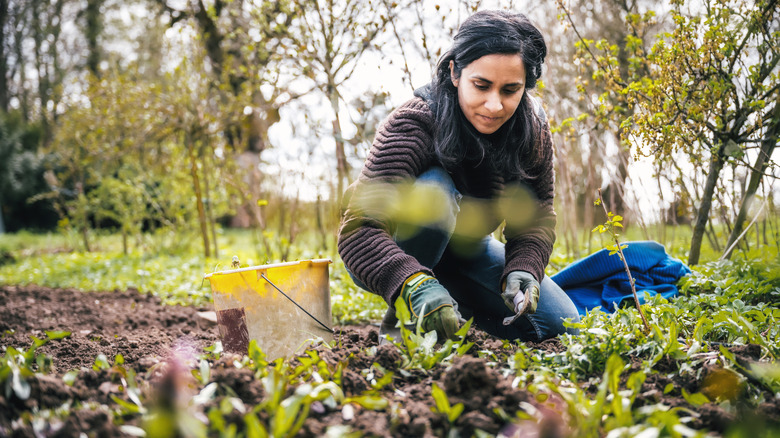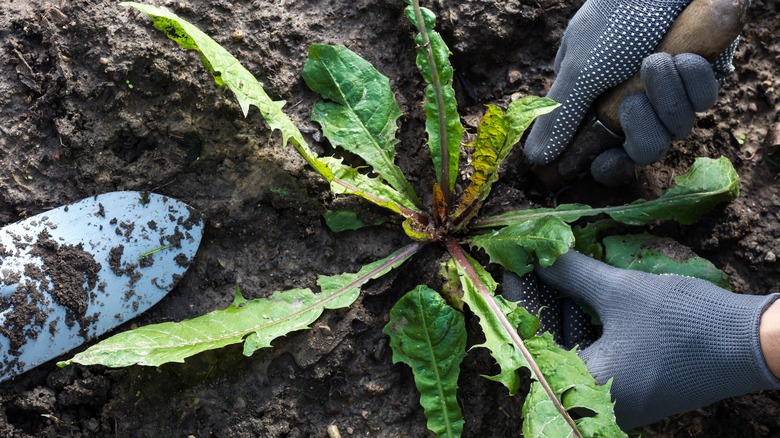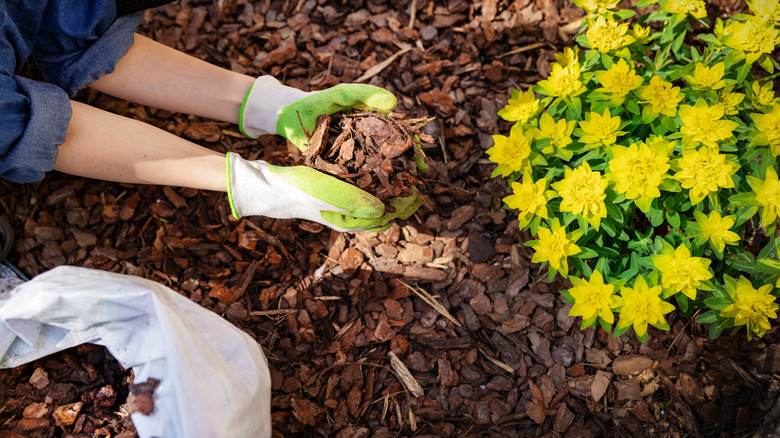Eliminate Invasive Weeds In Flower Beds With These Tips From Our Garden Coach
If discovering weeds in your garden is like finding a fly in your soup, then discovering a bunch of invasive weeds is like finding a whole hornet's nest. Even if you're careful to avoid the invasive plants you should never grow in your garden, your neighbors might not be so cautious, and widespread plants like bull thistle, garlic mustard, and common ragweed can quickly take root in your yard. To find answers about how to get rid of weeds in your garden, especially invasive weeds, we spoke to Rhonda Kaiser, founder and content creator behind Southern Home and Farm, and Tiffany Selvey, House Digest's own master gardener.
In the exclusive interview with House Digest, Selvey explained, "Invasive weeds are particularly concerning because, as the name implies, these weeds tend to take over much more quickly than their annoying neighbors." She also noted, "It's common for plants to be spread by nature. When a bird eats a Japanese honeysuckle berry, the seed does not get digested, so the bird can end up depositing it anywhere, including your flower beds. The same is true of other critters, and seeds are easily spread by the wind."
Because of weeds' ability to spread quickly, sap nutrients, and even harbor pests, Kaiser advised, "It is best to remove them at first sight." In their exclusive interviews with House Digest, Kaiser and Selvey shared some helpful tips for successfully removing these aggressive intruders, from hand-pulling to more intense chemical means. Here are the key steps the experts say you should take to remove invasive weeds and prevent them from returning to your yard.
Banish invasive weeds through hand-weeding and more
When it comes to removing invasive weeds, it's crucial to act fast. In her exclusive interview with House Digest, Rhonda Kaiser noted, "I find that if I don't address the problem immediately, it becomes an exponential problem." The most immediate way to start — and likely your gut reaction — is to try hand-weeding, and Kaiser said this can be a good technique in most cases: "Hand-weeding is always the most dependable method for removing weeds. Be sure to remove the entire root structure, as many roots can regenerate and cause new growth."
Tiffany Selvey also warned gardeners to be thorough when pulling invasive weeds. "These weeds spread many different ways. Some spread by rhizomes underground or stolons on the surface," she said. "... You'll need to remove the entire root or horizontal stem sections to keep them from continuing to spread."
If you find hand-weeding to be ineffective or too tedious when trying to tackle invasive plants on a large property, don't be afraid to call in reinforcements. "Garden tools are also very effective for weed removal," said Kaiser. "My favorite garden tool is a scuffle hoe." Kaiser also recommended trying organic, homemade recipes before resorting to any commercial herbicides. "A solid homemade recipe to try is a mixture of 1 gallon vinegar, 1 cup of salt, and 1 tablespoon of liquid dish soap," advised Kaiser. "Mix well and transfer to a spray bottle. Treat weeds and be sure to focus on the roots."
Protect your flower beds from returning weeds
After successfully eradicating invasive weeds from your garden, you might be tempted to rest on your laurels (or your roses or your tulips), but it's crucial to prevent these weeds from coming back. A few simple preventative measures can go a long way in protecting your garden from future attacks. In her exclusive interview with House Digest, Rhonda Kaiser advised, "If you are planting a new bed, start by placing down a layer of cardboard (without ink, as some can be harmful to your garden) or weed blocking fabric, then cover with at least 4 inches of organic matter/compost." Kaiser also recommended applying a pre-emergent weed control as needed and adding at least 3 inches of mulch. She warned, "Be sure to refrain from composting weeds with viable seeds, as they can reinfect your garden!"
In the end, you are your garden's best defense against weedy invaders, so knowing thy enemy can be very valuable. Tiffany Selvey remarked, "Invasive species take root exceptionally quickly, so it's really helpful to familiarize yourself with common invasives in your region and pull them as soon as you see them in your outdoor space."
To learn more about the specific weeds that grow near you and understand the best ways to combat them, Kaiser suggested, "Visit your local garden center to help identify and select the most appropriate control aids for your garden. They are often very knowledgeable on issues that arise in your area."


